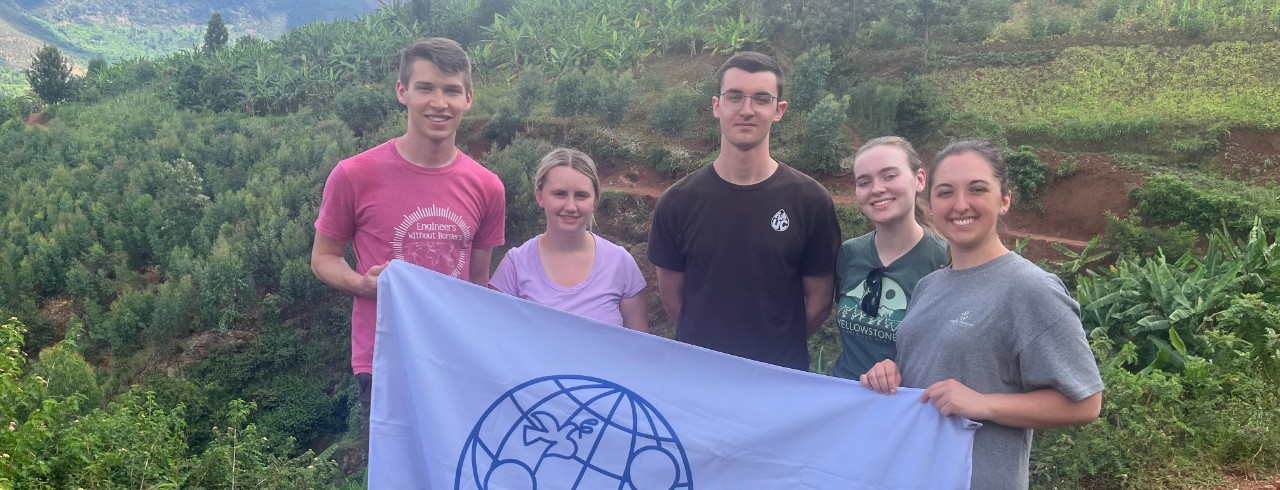
Engineering students to improve water infrastructure in Rwanda
Engineers Without Borders takes students all over the world
For nearly 20 years, students at the University of Cincinnati have traveled all around the world to work with communities to provide them with clean water and improved infrastructure. Through the national Engineers Without Borders, UC students have worked in Tanzania, Kenya, and most recently, Rwanda.
In May, a handful of UC members went to Gikingo, Rwanda, for their newest project. The purpose of this trip was to get an introduction to the community, understand its needs and collect data for designing a water infrastructure system.
"The connections with upper-class engineers and the entire network of Engineers Without Borders is so welcoming, and we're all working towards a great cause," said Eli Branstetter, a fourth-year mechanical engineering student and group member. "I found my place at UC. I enjoy the people, and I enjoy the work we're doing."

EWB students attended and presented at a government-level meeting during their trip to Rwanda. Photo/provided.
As the name suggests, most members of the group are engineering students, so the trip was coordinated around the tight schedule between students' classes and co-op assignments. The day after the spring semester ended, the group left for the 10-day trip to Rwanda. They stayed in Kigali, the capital city, roughly 30 to 45 minutes outside of Gikingo. Even with the community's proximity to the capital, they still do not have access to clean water.
To improve water infrastructure in the community, Engineers Without Borders has to assess and understand the community and its resources. One day of the trip was dedicated to conducting community surveys to get a better picture of where people are getting clean water and how much they are using and speaking with leaders at a government-level meeting. Additionally, the team did some preliminary fieldwork analyzing the undeveloped natural spring they plan to gather water from.

A group of students traveled to Rwanda to begin the new project. including Rachel Oatney (left) and Eli Branstetter (right) photo/provided.
"We were at the water source a lot on the trip," said Rachel Oatney, second-year biomedical engineering student. "We needed to survey the land and have a better idea of how much water we could get and how many people we could provide it to. We were there quite a bit to create options for what we could do and see what the community really needed from us."
The trip was during Rwanda's rainy season, which poses another water challenge for the community. The heavy rain washes mud down the ravine where the spring is located, contaminating the spring further and preventing community members from collecting water. The students are partnered with a local engineer in Rwanda who will continue to perform water tests and measure water flow for EWB-UC since they cannot be there to do it themselves.
"Three to five years is the ideal timeline for Engineers Without Borders," Branstetter said. "But it can depend on if the project is a one- or two-phase project, or more."
It was a great opportunity to see it all in person knowing I'll be in school for the next four years and get to watch this project progress.
Rachel Oatney, UC engineering student
For example, one of the active projects in Nyambogo, Tanzania, has been ongoing for more than a decade because it has had a multitude of phases. Nyambogo and Gikingo are two of three active projects, with the third being Burere, Tanzania. Together, these three projects have provided 20,000 people with 20 million liters of clean water. The new project in Gikingo will expand the impact of EWB over the next several years.
“It was a great opportunity to see it all in person knowing that I’ll be in school for the next four years and get to watch this project progress,” Oatney said. “I’ll be able to look back and say I was there before we did anything, witness the changes, and build relationships with these people.”
Along with international work in communities around the world, Engineers Without Borders also has a local impact through several domestic projects. The group works with Habitat for Humanity in the United States on various projects and with other Cincinnati local organizations on projects like building a wheelchair-accessible community garden and walking bridges.
During the fall semester in 2023, UC’s chapter of Engineers Without Borders facilitated more than 1500 hours of volunteer work. Founded by four engineering students decades ago, the group has turned into a dedicated chapter of more than 60 students who share the same passion for aiding the global water crisis. the chapter is open to students of all majors and years, with no experience required.
Featured image at top: UC Engineers Without Borders students in Rwanda. Photo/Provided
Want to make a global impact?
Visit the Engineers Without Borders webpage to learn more.
Related Stories
NEXT Innovation Scholar mixes global outreach with new ideas
June 10, 2024
As a first-generation student from Dubai, Jonathan Raj’s international background has been instrumental in shaping his expertise in intercultural communication and cross-disciplinary collaboration through the University of Cincinnati's NEXT Innovation Scholars program.
Engineering students to improve water infrastructure in Rwanda
October 2, 2024
For nearly 20 years, students at the University of Cincinnati have traveled all around the world to work with communities to provide them with clean water and improved infrastructure. Through Engineers Without Borders (EWB), a national organization, UC students have worked in Tanzania, Kenya, and most recently, Gikingo, Rwanda.
